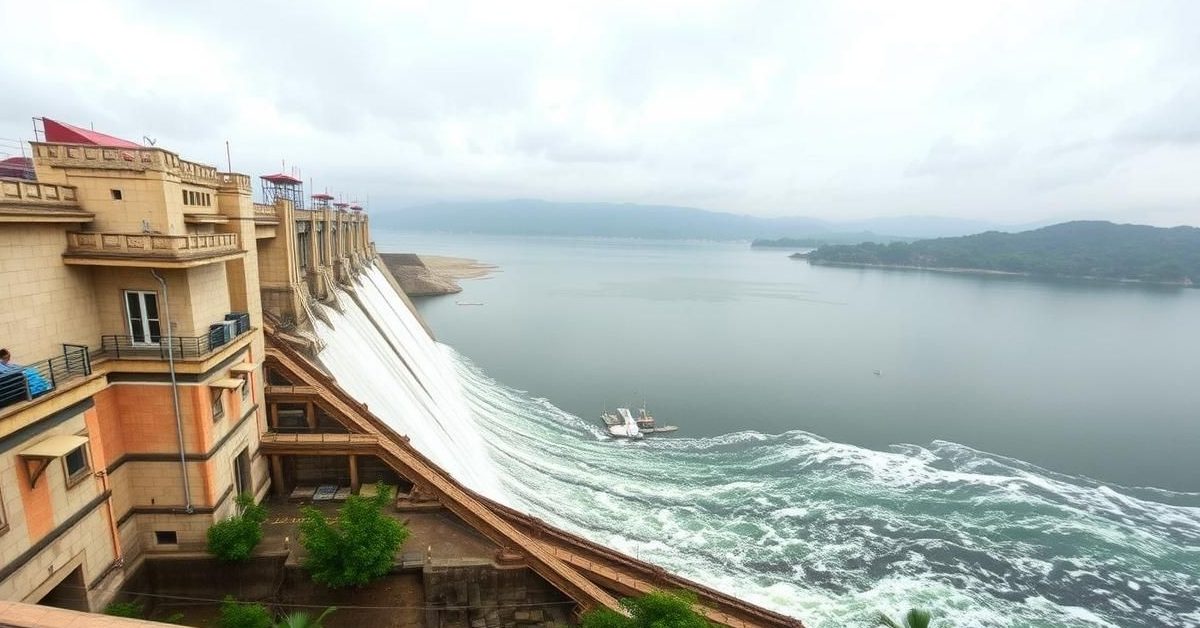This week’s news highlights span from significant infrastructure projects and legal clarifications to cultural heritage and environmental conservation efforts across India and beyond.
Sardar Sarovar Dam Operations and Features
The Sardar Sarovar Dam recently opened its gates for the first time this monsoon season, reaching a safe water level. This major project is a concrete gravity dam, standing 163 meters tall and spanning 1210 meters in length.
Built on the Narmada River, not the Tapi, it’s a multipurpose project. It provides irrigation water to Gujarat, Madhya Pradesh, Maharashtra, and Rajasthan. The dam also generates 1450 MW of eco-friendly hydropower annually.
Understanding Earthquake-Led Tsunamis
Tsunamis triggered by earthquakes require specific conditions. The earthquake must occur in a marine environment, displacing the sea floor, and be relatively shallow to retain its energy at the surface.
Such earthquakes typically result from “reverse” faulting, where one rock block moves upwards relative to another due to compression. Crucially, a tsunami-generating earthquake usually has a magnitude greater than 7.0.
The Historic Patalpani-Kalakund Railway Line
The 155-year-old Patalpani-Kalakund railway line, a heritage route in Madhya Pradesh, has restarted its operations after a temporary pause. Located in the Dr Ambedkar Nagar (Mhow)-Khandwa segment, this 9.5-kilometer section is a meter-gauge line, preserved in 2018 due to its challenging terrain.
The concept for this railway was first proposed in the 19th century by Maharaja Tukoji Rao Holkar II, who offered a substantial loan and free land for its construction.
India’s Surrogacy Legal Framework
India’s legal framework for surrogacy is governed by two key acts: The Assisted Reproductive Technology (Regulation) Act, 2021, and The Surrogacy (Regulation) Act, 2021. These laws set specific age limits for those seeking to have a child through surrogacy.
For married intended women, the age is between 23 and 50 years, while intended fathers must be between 26 and 55. Single women are permitted between 35 and 45 years of age.
Kavach: Indian Railways’ Safety System
Indian Railways prioritizes safety, evident in its indigenous Automatic Train Protection (ATP) system called Kavach. This system assists Loco Pilots by ensuring trains operate within speed limits and automatically applying brakes if needed.
Kavach also enhances safe train operation during adverse weather conditions. Adopted as a National ATP system in July 2020, its implementation is ongoing in phases.
The Kurds: A Stateless Ethnic Group
The Kurds, recognized as the world’s largest stateless ethnic group, have recently been in the news due to regional tensions. They primarily inhabit the highland regions of southern and eastern Turkey, northern Iraq, northeastern Syria, and northwestern Iran.
Smaller Kurdish communities also reside in parts of southern Armenia, Georgia, Kazakhstan, and Lebanon. Their language is related to Persian, with distinct local dialects like Kurmanji and Sorani.
Legacy of Rajendra Chola I
Prime Minister Narendra Modi recently offered prayers at the ancient Shiva temple of Gangaikonda Cholapuram in Tamil Nadu, a UNESCO World Heritage Site. This temple was built by Rajendra Chola I (1014-1044 AD) as his capital.
Rajendra Chola I established his capital after a victorious campaign where his army reached the Ganga river, defeating the Pala kingdom of Bengal. He was also a formidable naval power, leading successful maritime expeditions to Southeast Asia.
Innovative Bird Census in Kaziranga
Kaziranga National Park conducted its first-ever grassland bird census using an innovative technique: passive acoustic recording monitoring. This survey, carried out between March and May, aimed to record the park’s grassland bird population.
The census identified 43 grassland bird species, including several critically endangered, endangered, and vulnerable species according to the IUCN Red List, showcasing the diversity of this unique ecosystem.
Tiger Density in India’s Reserves
Recent monitoring initiatives in Kaziranga Tiger Reserve revealed a significant increase in its tiger population, from 104 in 2022 to 148. This places Kaziranga as the third-highest in global tiger density.
- Corbett Tiger Reserve (Uttarakhand) holds the highest tiger density.
- Bandipur Tiger Reserve (Karnataka) ranks second.
- Kaziranga Tiger Reserve (Assam) is third in density worldwide.
POSH Act and Workplaces
The Sexual Harassment of Women at Workplace (Prevention, Prohibition and Redressal) Act, 2013, commonly known as the POSH Act, mandates that both public and private workplaces establish an Internal Complaints Committee (ICC) to address sexual harassment grievances.
Recently, the Supreme Court declined a petition seeking to apply the POSH Act to political parties, stating that such a decision falls within the domain of policymakers.
Indian Chess Dominance
Indian chess continues to make waves globally. Divya Deshmukh recently entered the top 15 of the FIDE women’s world rankings after winning the FIDE Women’s World Cup 2025 title, becoming the fourth Indian woman to achieve this. Koneru Humpy remains the top-ranked Indian woman, followed by Harika Dronavalli.
In the open ratings list, India boasts three players among the world’s top six: Praggnanandhaa at world no. 4, followed by World Champion Gukesh at no. 5, and Arjun Erigaisi at no. 6.
71st National Film Awards Controversy
The 71st National Film Awards sparked debate in Kerala as the film “The Kerala Story” received honors for Best Direction and Best Cinematography. Sudipto Sen was awarded Best Director, and Prasantanu Mohapatra received Best Cinematography for the controversial movie.
The Return of Piprahwa Gems
The Ministry of Culture announced the return of the “Piprahwa Gems,” ancient Buddhist relics, to India. These precious artifacts, believed to be part of the Buddha’s relics, were unearthed in 1898 by an Englishman, William Claxton Peppé, from a Buddhist stupa in Piprahwa, Uttar Pradesh.
A portion of the collection, which had been passed down through the Peppé family, recently came up for auction, prompting their return through a public-private partnership initiative.
ICJ Clarifies Kyoto Protocol’s Status
The International Court of Justice (ICJ) recently issued a landmark ruling clarifying the legal status of the 1997 Kyoto Protocol. Contrary to a common understanding that it was superseded by the 2015 Paris Agreement, the ICJ asserted that the Kyoto Protocol remains in force and legally relevant.
This ruling marks the first authoritative confirmation that countries still have a legal obligation to comply with its provisions, clarifying its continuous status as international law.
Growth in Indian Aviation
India has emerged as the third-largest domestic aviation market globally, following the US and China. The government is actively investing in world-class airport infrastructure, significantly increasing handling capacity to 500 million passengers annually.
Currently, India has 162 operational airports. Uttar Pradesh leads with 17 operational airports, followed by Maharashtra with 15, and Gujarat with 13, reflecting a nationwide expansion in air connectivity.















